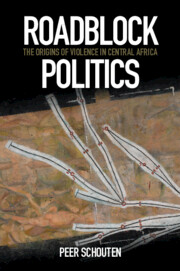Book contents
- Roadblock Politics
- Roadblock Politics
- Copyright page
- Epigraph
- Contents
- Figures
- Maps
- Tables
- Preface and Acknowledgements
- 1 Introduction: Sovereignty on a Shoestring
- Part I A Prehistory of the Roadblock
- Part II Roadblock Politics
- 5 La route, ça coûte: Roadblock Geographies
- 6 The Supply Chain Frontier
- 7 CAR: War of Roads
- 8 Non-conventional Logistics
- 9 Transparency Goes to War
- Conclusions
- Bibliography
- Index
8 - Non-conventional Logistics
from Part II - Roadblock Politics
- Roadblock Politics
- Roadblock Politics
- Copyright page
- Epigraph
- Contents
- Figures
- Maps
- Tables
- Preface and Acknowledgements
- 1 Introduction: Sovereignty on a Shoestring
- Part I A Prehistory of the Roadblock
- Part II Roadblock Politics
- 5 La route, ça coûte: Roadblock Geographies
- 6 The Supply Chain Frontier
- 7 CAR: War of Roads
- 8 Non-conventional Logistics
- 9 Transparency Goes to War
- Conclusions
- Bibliography
- Index
Summary
If the intricacies of global supply chains form one crucial aspect of roadblock politics, we also need to investigate another aspect of logistics in order to unpack Congo’s roadblock proliferation. Focusing on Central African hinterlands where roads are a fading memory, Chapter 8 asks how contemporary rebel groups adapt to a terrain that is inimical to military logistics as usual. Rebels themselves have best theorized what military logistics might look like in the debris of infrastructural empire. By providing a glimpse of the inner workings of a few of Central Africa’s many rebel groups, this chapter explores what one armed group itself dubbed ‘non-conventional logistics’. From the perspective of conventional, centralized states, this form of organization is suboptimal, but it is perfectly geared to withdrawal from and rebuttal of the reach of outside powers. Yet the purchase of this approach extends beyond rebels: given the overbearing logistical and geographical constraints, state agents by necessity also practise versions of guerilla foraging, blurring the lines between enemies. Taken together, the examples provided in this chapter prompt one to consider political control not as a fixed property of mutually exclusive territorial configurations, but rather as a mobile and temporary achievement in the political economy of circulation.
- Type
- Chapter
- Information
- Roadblock PoliticsThe Origins of Violence in Central Africa, pp. 202 - 231Publisher: Cambridge University PressPrint publication year: 2022



